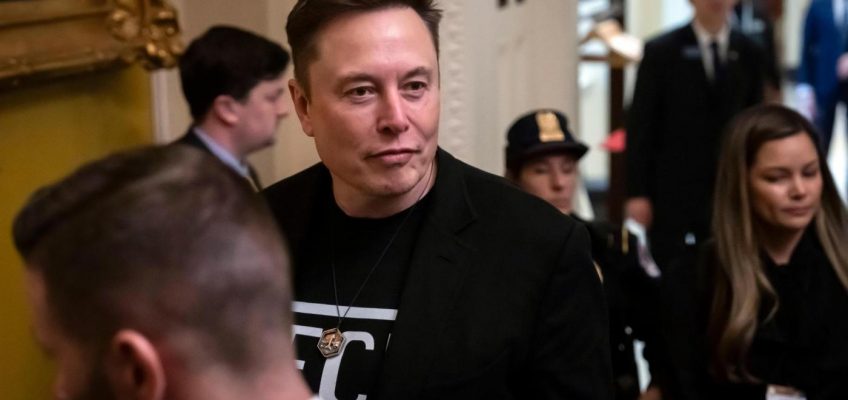By LISA MASCARO, Associated Press Congressional Correspondent
WASHINGTON (AP) — Billionaire Elon Musk arrived on Capitol Hill Tuesday and learned about something new — budget rescissions, an obscure legislative tool that could bring legal heft to his federal budget slashing effort and enshrine the cuts into law.
Musk joined a lunch meeting with Republican senators just hours after the Supreme Court issued a setback to the Trump administration’s efforts to freeze some $2 billion in foreign aid funds as part of its sweeping shutdown of the U.S. Agency for International Development. As he opened the private session, Musk led with a message urging Congress to act.
How Trump justifies his tariffs — from budget balancing to protecting ‘the soul’ of America
Minnesota farmers brace for fallout from Trump’s trade war with Canada and Mexico
Trump reaches 36.6 million television viewers for first address to Congress in second term
Scientists raise concerns as the US stops sharing air quality data from embassies worldwide
Appeals court allows removal of head of watchdog agency as legal battle rages over Trump firing
Over plates of fried catfish, senators explained how the White House could put the billions of dollars of savings he has amassed into what’s called a budget rescissions package, and send it to Congress for a vote to rescind the funding. Musk seemed thrilled, they said.
“He was so happy,” said Sen. Lindsey Graham of South Carolina, the Republican chairman of the Senate Budget Committee, who is among those championing the effort. “He didn’t know.”
Later, Musk met with House Republicans at dinnertime in the Capitol basement.
“You know, there’s a lot of room — a lot of opportunity — to improve expenditures in the government,” Musk said after the closed-door session. “And then we’re making good progress.”
The proposal from senators to consider the budget rescission tool introduced a potential next phase of his Musk’s Department of Government Efficiency efforts and comes at an important time. The Trump administration is fighting in court — and in the court of public opinion — over the budget cuts tearing through the federal government.
The Trump administration and Republicans in Congress are eager to show voters that DOGE’s actions are more than headlines of job losses and disruptions, but real savings as Musk’s team roots out waste, fraud and abuse to help reduce the nation’s staggering $2 trillion annual deficit.
It also comes as the courts are looking skeptically at the legality of the Trump administration’s actions and as lawmakers’ town halls are being overrun by protesters pushing for answers as tens of thousands of federal workers are being fired.
Senate Majority Leader John Thune half-joked that he was a little worried after Musk gave out his cellphone number for senators to call with any concerns.
“I thought, OK, his phone’s going to start blowing up,” Thune said on Fox News. “He might want to change his number.”
Senators said Musk aide Katie Miller would be setting up a direct line they can also call with any questions or problems about the cuts.
Sen. Josh Hawley, R-Mo., said senators seemed to be asking for “just better communication, wanting to know what’s going to happen next.”
But Hawley said, “I don’t know that anyone at the White House knows what’s going to happen next.” He said Musk’s team seems to “just kind of go from one thing to the next.”
It was Sen. Rand Paul, R-Ky., who introduced the idea of using budget rescissions during the lunch meeting.
Sen. Rand Paul, R-Ky., gestures as he leaves after Senate Republicans met with Elon Musk, at the Capitol in Washington, Wednesday, March 5, 2025. (AP Photo/Ben Curtis)
“I love what Elon is doing. I love the cutting into waste. I love finding all the crazy crap that we’re spending overseas,” Paul said afterward.
“But to make it real, to make it go beyond the moment of the day, it needs to come back in the form of a rescission package,” he said.
The libertarian-leaning senator has long stood as among the most persistent budget hawks in the Senate, one who routinely votes against federal spending bills. He said he’s planning to oppose the federal funding package that’s expected next week, which is needed to prevent a federal government shutdown when money expires March 14.
Paul said he explained to Musk that after the morning Supreme Court ruling, the administration should drop its plans to claw back federal funds through what’s called impoundments. The courts do not seem inclined to accept the legal arguments being presented challenging the Nixon-era Impoundment Control Act.
Instead, Paul said, “My message to Elon was, let’s get over the impoundment idea and let’s send it back as a rescission.”
Senators said it was unclear how big the rescission packages could be — Paul suggested several packages of at least $100 billion in federal cuts — or how soon they might push ahead with any voting if the White House sends them to Capitol Hill.
Musk has previously told lawmakers he envisions DOGE can save some $1 trillion in the federal government this year alone.
Thune and other GOP leaders did not immediately make any comments on the rescission plans.
The idea was only mentioned briefly at the meeting with House Republicans, who said Musk mainly provided examples of specific problems he was finding.
Musk also told House Republicans he was not responsible for the firings of Department of Veterans Affairs workers or others, and said those decisions are being made by the specific agencies.
“Elon doesn’t fire people,” Rep. Richard Hudson, R-N.C., said afterward. “It’s the agencies.”
While a rescission package can be approved in the Senate by a simple majority vote with an expedited process that would enable the Republican majority to maneuver around a potential filibuster by Democrats, it may be easier said then done.
Senators on the Appropriations Committee are likely to pan the idea of spending cuts that would essentially go against legislation they had already approved to fund the government, as would those who may want to preserve federal funding for certain home-state industries or programs that are important to constituents.
Even with a GOP majority, it could be difficult to keep all Republicans unified on a vote, especially if all Democrats are opposed.
Graham, the Budget chairman, sees the process as a way “for the White House to go on offense.”
“We’re losing altitude,” he said. “We need to get back in the game, on offense, and the way you can regain altitude is to take the work product — get away from the personalities and the drama — take the work product and vote on it.”
Absent from the lunch meeting with Musk was much discussion about the federal workers who are now out of work after the DOGE cuts.
“Any time there’s a transition, it’s difficult,” Paul said.
The senator said several people spoke up to make sure “we’re not just getting rid of people that we actually need, and that we are not overdoing it.”
Still, Paul said: “We do need a smaller government. We do need less federal workers.”
Associated Press reporter Leah Askarinam contributed to this report.




